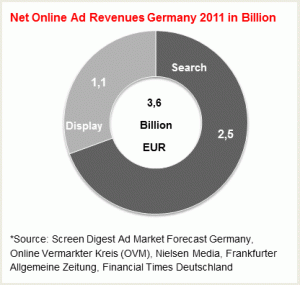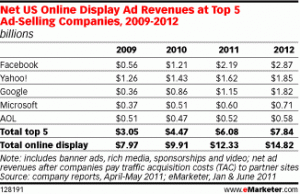As Facebook & Google Begin To Dominate German Display, Can The Sales House Rise To The Challenge And Offer A Competitive Solution
by Ciaran O'Kane on 13th Apr 2012 in News


Nicolas Clasen is Managing Director, Germany, at Improve Digital, a real-time advertising technology provider. Here Clasen discusses the opportunity for German Sales Houses around data-driven advertising, and how they should position themselves to win the majority of this new budget.
Like elsewhere in Europe, traditional sales houses in Germany are still missing a solid revenue model for their cost-intensive premium content. While TV stations seem to be saved by an overwhelming demand for video from agencies and advertisers, print publishing houses are getting into more and more trouble.
With the rise of data-driven advertising and Real Time Bidding, that might change. But Google and Facebook are aggressively pushing into the market and publishers are finding themselves under pressure. To maintain direct relationships with their advertising customers and stay in control of their online audience and inventory, German media owners have to invest in technology, build internal data pools and start to own the automated sales channel for online display advertising.
Looking at the overall net market spend in online advertising, Google dominates the space in the Germany, possibly more than in other European countries. According to numbers that where presented at Medientagen München in October 2011 by Marc Al-Halmes, ex-McKinsey Consultant and now Director of Business Development at Tomorrow Focus AG (Germany’s second biggest digital sales house according to the German auditing organization AGOF), nearly 70% of net online ad spending is going directly to Palo Alto’s search giant, Google.
 These figures might seem surprising as most official reports present much higher gross numbers in online advertising. But in an interview with the Frankfurter Allgemeine Zeitung, Paul Mudter, the president of the publisher task force at Germany’s biggest digital association BDVW, also confirmed there was around 1 billion net revenues in online display advertising in Germany, in 2011.
These figures might seem surprising as most official reports present much higher gross numbers in online advertising. But in an interview with the Frankfurter Allgemeine Zeitung, Paul Mudter, the president of the publisher task force at Germany’s biggest digital association BDVW, also confirmed there was around 1 billion net revenues in online display advertising in Germany, in 2011.
And while TV stations seem for now to be saved by an overwhelming demand for video from agencies and advertisers, print publishing houses are getting into trouble as Facebook and Google begin to dominate the display market.
Facebook and Google challenge traditional models and look to dominate in the display market
In the US in 2011, Facebook took over the market leadership in display advertising ahead of Yahoo, MSN and Google. Facebook is now not only the biggest online display sales house in the world, but it has also become a giant data targeting pool for branding advertisers around the globe.
But Google is also aggressively pushing into display offering retargeting technologies and using their search data to find the right ad for each user and drive up the advertisers ROI. The missing link though for Google is still the premium environment for branding display ads. This could have been the key driver for Google’s acquisition of Admeld and its premium publisher customer base in the US.
However, premium sales houses and publishers still own the brand safe environment. This might provide them with the edge they need to compete directly with Google and Facebook. The automated display ecosystem puts publishers back in the game.
 Data driven advertising in a qualitative content environment presents a huge opportunity to sales houses and publishers. Agencies and advertisers can buy inventory at large scale across several publishers and sales houses through an automated process; the buying decision is merely based on data, most of which is currently retargeting data. Retargeting is a pretty simple way to create a personalized offer to a user, but it increases the performance significantly on both sides of the coin. The advertiser gets higher CTR and the publisher gets a higher eCPM. This is just the start for data usage in a premium environment and the payouts are still not satisfying for the individual publisher. That will change if more sophisticated targeting mechanisms enter the market, and more data will give publishers the ability to make ads that are much more relevant to each single unique visitor.
Data driven advertising in a qualitative content environment presents a huge opportunity to sales houses and publishers. Agencies and advertisers can buy inventory at large scale across several publishers and sales houses through an automated process; the buying decision is merely based on data, most of which is currently retargeting data. Retargeting is a pretty simple way to create a personalized offer to a user, but it increases the performance significantly on both sides of the coin. The advertiser gets higher CTR and the publisher gets a higher eCPM. This is just the start for data usage in a premium environment and the payouts are still not satisfying for the individual publisher. That will change if more sophisticated targeting mechanisms enter the market, and more data will give publishers the ability to make ads that are much more relevant to each single unique visitor.
The old fashioned premium model in online sales is here to stay, but will become more bespoke and tailored to brand advertisers’ needs, yet we still don’t see the big branding budgets moving towards the premium sales channel. But big online spend is expected to move into the automated channel and publishers should not miss out on this opportunity. Media agencies are expected to spend more and more through agency trading desks but crucially, they will continue to seek brand-safe content environments.
Here's a road map on how publishers can get back in the game on display budgets:
Don’t fight the automated process, own it
Publishers and media sales houses should be prepared to move into this new area, learn how to operate in the automated channel and build up their own expertise, teams, knowledge and data pools to get to know their audience much better. This will help them become active players in this game.
Media sales houses and publishers should invest in technology, design the automated process themselves and become an active part of it. They need to create solutions for automated buying which fulfill the ROI requirements of advertisers and marketers.
Build your own data pools, know your audience
The more a publisher knows about their own audience, the easier it will be to serve the right ad to each individual and increase the ROI for the advertiser. The goal for the publisher in this process must be to gather as much information as possible about the audience, make this data available for media buyers and maximise the revenue per unique user by finding the right ad for each individual. If the performance of each campaign is satisfying for the advertiser, premium publishers will be able to charge more for their premium environment, quality content and strong media brands. But this will depend on good performance and high CTRs for each campaign.
Data can also become a unique selling point for each publisher in the automated channel. Networks and Agencies are building up data pools across all platforms and the only way to differentiate between the level of knowledge about this audience, is a publishers’ own internal data pool. Real Time Bidding now gives publishers the ability to directly include all kinds of data in the pricing process within milliseconds and increase the value and performance for advertisers.
Retain the customer relationship
By developing their own private ad exchanges, publishers can build stronger relationships directly with advertisers and agencies. With this model, publishers’ inventory is directly connected to the automated trading desk of the media buying agency. This then enables publishers to offer their own unique data, targeting and re-targeting functionalities, and their premium environment to their advertising customers.
The game is still afoot and media sales houses have a good hand to play including strong media brands and high quality content. But more important than this is that they still own the direct relationship with advertisers and agencies. Combined with the right offer to the online advertiser they are able to gain from the automated process in the display market place. Publishers who are reluctant to take these steps and face the challenge are at risk of disappearing behind a wall of third party technology and ultimately losing their direct customer relationships.
Tickets for the Ad Trader Conference in Hamburg on April 19 are still available. Check out the list of speakers already confirmed for the day.
Ad ServerDACHDisplayProgrammaticPublisherSSPTrading








Follow ExchangeWire